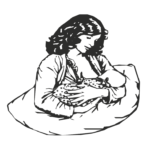
Here’s a question from Ruth in North York, ON:
Q: I have a question – hope you can help! I just had my second baby three days ago – and I’m so uncomfortable with engorgement! It started yesterday, and my friend told me to put warm towels on my breasts and to pump to relieve the discomfort. Another friend told me today to use cold compresses. Who is right?
A: Well, Ruth, both friends ‘ advice can be helpful, when used at the right time. Engorgement is a very normal experience for new mothers – often on Day 2 or 3, or as late as Day 5, many nursing mothers feel a real difference in their breasts. Hormonal changes cause blood to rush to the area as the mature milk begins to replace the colostrum, and blood and lymph fluid causes swelling of the breast tissue. The best strategy to relieve your discomfort – your baby! Nurse frequently, every two hours or more often, so the baby can regulate the “supply and demand”. While I don’t recommend pumping in the first 6 weeks unless your baby is unable to nurse effectively (or your lactation consultant has advised this for a reason unique to your case), it can be helpful to hand- express some milk to soften the areola and make it easier for the baby to latch onto very swollen breasts. Excessive pumping or hand expression can actually make engorgement worse by encouraging increased milk production.
As for compresses, it can be helpful to apply cold compresses between feedings (try 20 minutes on, 20 minutes off and repeating this). My mother’s method was to wet a tea towel, wring it out, fold it in thirds length-wise and place it in the freezer. Applying the frozen tea towel across the breasts and under the arms felt wonderful and helped to ease the discomfort. A bag of frozen peas, wrapped in a towel, applied to each breast also works well, or the midwife’s trick of a leaf of green cabbage inside each bra cup. The tannic acid in the cabbage helps to reduce the swelling. Using the cabbage a couple of times a day is best, and it should be discontinued as soon as engorgement starts to ease, as some say that excessive use of cabbage can lower the milk supply. Warm compresses should be applied for a few minutes just before a feeding – a warm, moist washcloth works well. This will help the milk start to flow at feeding time but will not reduce swelling – in fact, if used between feedings warm compresses have the effect of increasing swelling.
Be patient, Ruth – engorgement usually lasts only about 48 hours! However, if it is not reduced using these methods, or is worse, or if you have a fever of greater than 100.5 degrees F, I recommend that you consult your Lactation Consultant or physician.
Nancy Lahn RN
Owner, Cozy Cuddles Baby Products
Developer of the Cozy Cuddles Nursing Pillow
Originally posted 2017-02-01 12:48:20.

 A: While pregnant women may doubt their ability to feed their babies, your body assumes that you will breastfeed and begins to prepare for it right from the day you conceive! The milk production tissues and ducts develop throughout your pregnancy, and it is estimated that 97% of women are physically capable of producing all the milk their baby will need. The key is ensuring that the baby latches well to the breast so that he/she can access the wonderful milk that you have!
A: While pregnant women may doubt their ability to feed their babies, your body assumes that you will breastfeed and begins to prepare for it right from the day you conceive! The milk production tissues and ducts develop throughout your pregnancy, and it is estimated that 97% of women are physically capable of producing all the milk their baby will need. The key is ensuring that the baby latches well to the breast so that he/she can access the wonderful milk that you have!